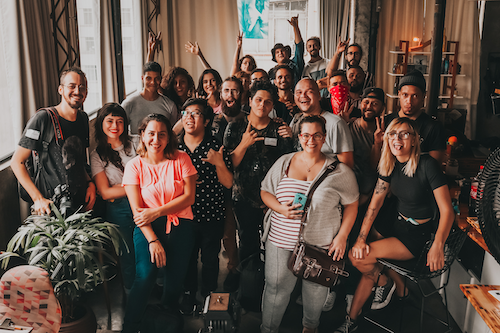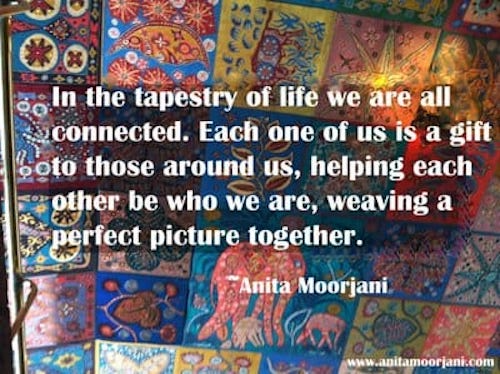-being along the way so you can sustain your momentum as you progress down your path of achievement.
So what you do if you have high aspirations, but feel a bit daunted by all the different life factors you will be juggling?
Positive psychologists have identified six essential factors that contribute to lasting wellbeing: positive emotions (P), engagement (E) in activities, positive relationships (R), a belief that life has meaning (M), and accomplishment (A), and Vitality (V) (This is referred to as the PERMA-V model.)
This post will introduce you to these PERMA-V factors, and the different ways that they are important for any kind of flourishing. In future posts, we will go deeper in different aspects of this model and how I apply these ideas my work with my coaching clients to energize their efforts and sustain their overall wellbeing.
1. Positive Emotions (P)

To experience well-being, you need positive emotion in your life. Any positive emotion such as peace, gratitude, satisfaction, pleasure, inspiration, hope, curiosity, or love falls into this category. The message here is that it’s really important to enjoy yourself in the here and now, just as long as most of the other elements of PERMA are in place, too.
Why should this be important to you as you work on your goals? When you are feeling positive and unstressed, you are not in information overload, and you have the energy to be curious. You are more likely to see opportunities because the parts of your brain (frontal lobes) that manage problem solving and strategic planning work better. You are also more likely attract people who are willing to support you if they see that you are genuinely glad to be around them.
2. Engagement (E)

When you are truly engaged in a situation, task, or project, you enter an altered state known as “flow.” When you are in a flow state, time seems to stop. You lose your sense of self, and you can concentrate intensely on the present. Your regrets about the past and fears about the future drop away.
Why should this aspect of flourishing be important to you as you work on your goals? if you can develop your ability to enter into flow states, you will find that you are less likely to feel overwhelmed–and more likely to enjoy–mastering the myriad activities needed to achieve your goals.
3. Positive Relationships ®

As humans, we are “social beings,” and good relationships are core to our well-being. Psychologists have consistently found—and you know from experience–that people who have meaningful, positive relationships with others are happier than those who do not. Relationships really do matter!
Why should this be important to you as you work on your goals? (I expect that you are beginning to get the picture!) Whatever your goal, it is important to establish positive relationships with people in your life (family, clients, customers, etc.) so that they will know, like and trust you. When they do, they are much more likely to be loyal supporters. If you are working on a project or building a business, they will be happy to refer people they know could help you.
If you have an ambitious project, like growing a business or some other kind of organization, you will need to build a social system composed of effective leaders and productive teams. When you focus on establishing positive relationships with members of your staff and facilitating positive relationships with each other, you will make your enterprise a place where people want to work—and ultimately make it easier to achieve your organizational mission.
4. Meaning (M)

,Meaning arises out of serving a cause bigger than yourself. Whether this is a specific deity or religion, or a cause that helps humanity in some way, we all need meaning in our lives to have a sense of well-being.
Why is this important to you as you work toward your goals? (Think of this repeated question as your mantra in coaching.) What is the compelling purpose that propels you through your life, that launches you out of bed every day, and fuels your passion? This is called “the big Why.”
Is your goal to have some kind of professional or business success. Do you want to earn more money? Or are you motivated the desire for greater control over and flexibility in what work you do and how you do it. Do you enjoy collaborating with others to produce something that you could not achieve on your own? These are all goals related to material success.
However, the lure of material success often becomes less compelling over time, and other goals and values assume greater importance. As you mature, you may find yourself becoming more interested in creating legacies for your family, community, the country or the world. At this life stage,you now begin ti be motivated by the desire to create something meaningful, something that’s going to outlast you. Such legacies outlast accumulated wealth or experiences. Keeping your legacy in mind from the beginning can guide your decisions and help keep the routine work involved in pursuing your goals more meaningful.
5. Accomplishment/Achievement (A)

Most of us strive to better ourselves in some way, whether we seek to master a new skill, achieve a valuable goal, or win in some competitive event. This factor also includes the role of grit, the ability to persist in overcoming obstacles in pursuit of long term goals. As such, being motivated to achieve mastery and find satisfaction in our accomplishments is also contributes to our ability to flourish.
Why is this important to you as you work on your goals? With the advent of the information age, we are now all our own Chief Learning Officers (CL). The Web offers each of us an incredibly rich array of resources, in beyond programs in institutions, to acquire knowledge and skills you need to achieve your goals. But you have to find the motivation to tap these wellsprings of knowledge Realistically, you will not succeed in all your efforts to achieve your goals. You must also learn to have “grit,” the attitude that failures are opportunities to learn. This kind of resilience is an achievement in itself, and can help you regroup and recover after failures.
6. Vitality (V)

The Miriam Webster dictionary defines vitality as “physical and mental vigor, and endurance.” Earlier thinking about the PERMA model focused primarily on mental and emotional activities. In 2014, positive psychologists recognized the importance of physical health and movement in flourishing and added Vitality to the PERMA model.
To build and sustain physical vitality, you need to develop the right habits: healthy diet, adequate sleep, and regular exercise. Following these lifestyle recommendations have the added benefits of supporting brain health and reducing your risk of dementia and Alzheimer’s Disease. Vitality also depends your avoiding unhealthy lifestyles, such as substance abuse and excessive TV and media use.
One last time! Why is this important to you as you work on your goals? To achieve your goals, you need to have the physical endurance to work hard to complete tasks. You need to have the mental strength to solve problems as they arise. If you exercise regularly, eat a healthy diets, and get enough high quality sleep, you will help your brain to work efficiently, and be able to maintain a positive outlook on life.
How can coaching can help you flourish?
As you read through these brief descriptions of PERMA_V factors and how they play out when you decide to pursue your dreams, were you excited about all your opportunities to flourish? Or, did you find yourself feeling a little anxious, worried about whether you had enough of all the PERMA conditions in place for you so succeed in achieving your goals.
Take a moment to download this Flourishing Index self-assessment to see where you are strong in your flourishing and those areas which could use some work.
